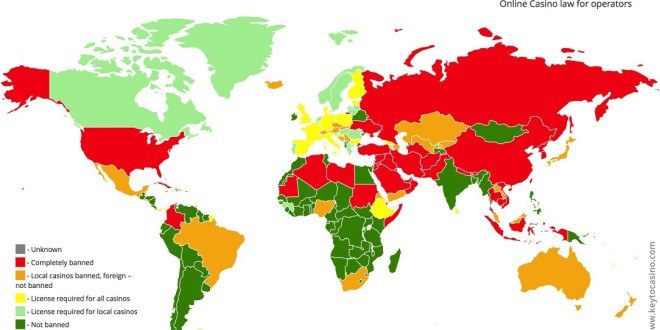Online gambling laws differ dramatically around the world. More than half the population of the globe is banned by law from accessing an online casino in the country in which it lives. However, conversely, more than 60 different countries have licensed online gambling that enable citizens to place wagers.
In some places around the world, casinos of any kind, whether online or brick-and-mortar, are banned entirely. Yet, in others, both are permitted. In the countries that do allow casinos to be set up, local companies are banned from their operation while foreign companies are permitted to trade. There are also other complicated rules, including the country’s own citizens being banned from using casinos while visitors from other countries are permitted to play to their hearts’ content. In the case of one country, people who earn under a specific amount per year are banned from gambling altogether.

An Overview of Global Gambling Legislation
 Government regulation of gambling is nothing new, and, indeed, there have been rules in place regarding gambling since the ancient Roman and Chinese societies. The earliest modern casino in the form that we recognize it today was the “Il Ridotto” of Venice, Italy, in the 17th century. And, even that was controlled by the government. It stands to reason, then, that virtually every country around the world has unique gambling laws. While in most places, there is government control of the industry implemented through supervision, regulation and licensing, in other places, gambling is entirely forbidden.
Government regulation of gambling is nothing new, and, indeed, there have been rules in place regarding gambling since the ancient Roman and Chinese societies. The earliest modern casino in the form that we recognize it today was the “Il Ridotto” of Venice, Italy, in the 17th century. And, even that was controlled by the government. It stands to reason, then, that virtually every country around the world has unique gambling laws. While in most places, there is government control of the industry implemented through supervision, regulation and licensing, in other places, gambling is entirely forbidden.
Gambling in Brick-and-Mortar Casinos
Since brick-and-mortar casinos have been around for a lot longer than their online counterparts, most countries have long-established laws regarding their use and operation. There are 51 countries around the world that have banned land-based casinos entirely, with six additional countries banning citizens from gameplay while visitors from overseas can participate. In 17 other locations, casinos are restricted to specific cities or localities. The remaining 67 percent of countries (151 in total) have fully legalized land-based casinos in their territories, although only 47 percent of the world’s population can access casinos in their home country.

The Situation with Global Online Gambling Laws
When it comes to online gambling laws, the situation around the world is a little more complex and mixed. This is because some countries have different regulations surrounding the way in which they treat foreign casino operators and those that are local, however — overall around 56 percent of the population of the world — have a ban implemented when it comes to online gambling.
There are 39 countries that have completely banned online casinos, while another 32 have banned local casino operators from plying their trade while allowing foreign operators to take bets online. There are numerous reasons given for this, including the lack of influences or resources to prevent foreign casinos from offering access to their services online. There are 61 countries that permit the operation of online casinos as long as they are licensed.
Although in 50 percent of those countries, the requirement for a license is only enforced strictly on local operators. Foreign casino operators are often able to take wagers even if they have no license since there is either a lack of willingness or ability to prevent foreign companies from providing access to their online gambling services. There are 93 remaining countries that do not have an explicit ban on online casino operators, however, because they are also unlicensed, there is no guarantee of security, safety or quality.
Comparing the Data
 When it comes to comparing the way in which countries handle their treatment of online and real-world operators, things get even more interesting. There are 168 countries that permit their citizens to place wagers in brick-and-mortar casinos. However, some of those only permit casinos to be opened in certain regions of their country. Of those 168, 27 have an outright ban on online versions, 60 operate a form of regulation for online casinos and the remaining 81 have no form of ban in place. While 44 countries worldwide have banned both online and land-based casinos, in 13 others, the local population is permitted to play online even though land-based ones are banned. As you can see, it’s confusing.
When it comes to comparing the way in which countries handle their treatment of online and real-world operators, things get even more interesting. There are 168 countries that permit their citizens to place wagers in brick-and-mortar casinos. However, some of those only permit casinos to be opened in certain regions of their country. Of those 168, 27 have an outright ban on online versions, 60 operate a form of regulation for online casinos and the remaining 81 have no form of ban in place. While 44 countries worldwide have banned both online and land-based casinos, in 13 others, the local population is permitted to play online even though land-based ones are banned. As you can see, it’s confusing.
What Happens to People Who Bet?
So, what happens to punters in the 132 countries where online casinos are restricted or banned if they place a bet online? Well, in 92 of the 132 countries, there is no penalty imposed, so nothing unfortunate happens. In 15 countries, there is an administrative penalty imposed on players who are caught, while in the remaining 25, criminal penalties are imposed on unlucky punters. There are even some countries that go the extra mile to prevent citizens from accessing online casinos to place illegal wagers. There are 36 countries that demand their Internet-service providers block user access to either all or some casino websites, while 18 others have put an order in place to force banks to block financial transactions from casinos.
How Do Casinos Operate?
 Although there are regulations and law in place, they do not necessarily prevent casinos from operating. In fact, there are several casinos that claim to run their operations in areas in which they are restricted or banned. Almost a quarter of online casinos do restrict access to those players who reside in countries where licensed are required for casino operation and 22 percent restrict their access to those players who reside in a country with a restriction or ban in place. Overall, 16 percent of online casinos restrict player access even if they live in a country where overseas companies are permitted to operate, and 14 percent restrict player access if they live in a country where foreign operators are permitted but local casinos require a license.
Although there are regulations and law in place, they do not necessarily prevent casinos from operating. In fact, there are several casinos that claim to run their operations in areas in which they are restricted or banned. Almost a quarter of online casinos do restrict access to those players who reside in countries where licensed are required for casino operation and 22 percent restrict their access to those players who reside in a country with a restriction or ban in place. Overall, 16 percent of online casinos restrict player access even if they live in a country where overseas companies are permitted to operate, and 14 percent restrict player access if they live in a country where foreign operators are permitted but local casinos require a license.
In fact, 14 percent of online casinos restrict player access even if they live in a country that has no restrictions on online gambling. When it comes to the countries whose citizens are banned, the countries involved will vary. However, the United States is at the top of most banned lists, closely followed by Israel and France. American players are banned from a shocking 72 percent of online casinos worldwide, with 70 percent banning French players and 54 percent banning those from Israel. The countries that are least restricted by online casinos include Austria, Sweden, Argentina, New Zealand, and Iceland, and they have their choice of online operators to choose from.
Other Fascinating Gambling Facts from Around the World
Interestingly, gambling laws have thrown up some other complexities and peculiarities. For example, in some places, ships are permitted to have casinos even though they are banned on land. In Israel, police can arrest anyone who is found in a place offering gambling services without any proof that they were playing. Although in many countries in the Middle East gambling is not officially restricted, it is prohibited by the Quran. As a result, no citizen must participate in it. And, in the Turks and Caicos, only people with a salary of more than $75,000 a year can use casinos! Yes, it’s clear to see that legislation surrounding gambling, online or otherwise, can be a minefield, so it’s worthwhile doing your research before placing a bet!
Disclaimer: All images are copyright to their respective owners and are used by USA Online Casino for informational purposes only.










